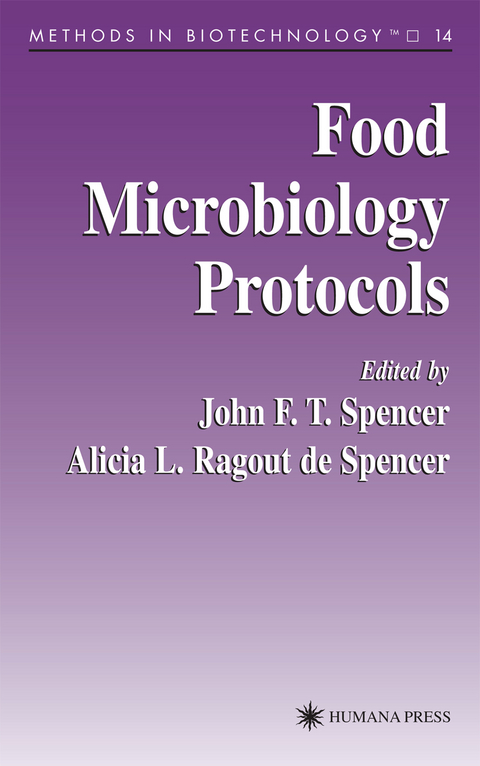
Food Microbiology Protocols
Humana Press Inc. (Verlag)
978-1-61737-230-8 (ISBN)
Spoilage Organisms.- Psychrotrophic Microorganisms.- Biochemical Identification of Most Frequently Encountered Bacteria That Cause Food Spoilage.- Mesophilic Aerobic Microorganisms.- Yeasts and Molds.- Coliforms.- Genetic Analysis of Food Spoilage Yeasts.- Pathogens.- Conductimetric Method for Evaluating Inhibition of Listeria monocytogenes.- Molecular Detection of Enterohemorrhagic Escherichia coli O157:H7 and Its Toxins in Beef.- Detection of Listeria monocytogenes by the Nucleic Acid Sequence-Based Amplification Technique.- Detection of Escherichia coli O157:H7 by Immunomagnetic Separation and Multiplex Polymerase Chain Reaction.- Detection of Campylobacter jejuni and Thermophilic Campylobacter spp. from Foods by Polymerase Chain Reaction.- Magnetic Capture Hybridization Polymerase Chain Reaction.- Enterococci.- Salmonella.- Campylobacter.- Listeria monocytogenes.- Fermented Foods.- Methods for Plasmid and Genomic DNA Isolation from Lactobacilli.- Methods for the Detection and Concentration of Bacteriocins Produced by Lactic Acid Bacteria.- Meat Protein Degradation by Tissue and Lactic Acid Bacteria Enzymes.- Maintenance of Lactic Acid Bacteria.- Probiotic Properties of Lactobacilli.- Identification of Exopolysaccharide-Producing Lactic Acid Bacteria.- Differentiation of Lactobacilli Strains by Electrophoretic Protein Profiles.- Methods to Determine Proteolytic Activity of Lactic Acid Bacteria.- Methods for Isolation and Titration of Bacteriophages from Lactobacillus.- Identification of Yeasts Present in Sour Fermented Foods and Fodders.- Organisms in the Manufacture of Other Foods and Beverages.- Protein Hydrolysis.- Production of Polyols by Osmotolerant Yeasts.- Identification of Yeasts from the Grape/Must/Wine System.- Carotenogenic Microorganisms.- Genetic and Chromosomal Stability of Wine Yeasts.- Prediction of Prefermentation Nutritional Status of Grape Juice.- Enological Characteristics of Yeasts.- Utilization of Native Cassava Starch by Yeasts.- Methods and Equipment.- Reactor Configuration for Continuous Fermentation in Immobilized Systems.- Molecular Characterization of Yeast Strains by Mitochondrial DNA Restriction Analysis.- Selection of Yeasts Hybrids Obtained by Protoplast Fusion and Mating, by Differential Staining, and by Flow Cytometry.- Selection of Hybrids by Differential Staining and Micromanipulation.- Flotation Assay in Small Volumes of Yeast Cultures.- Obtaining Strains of Saccharomyces Tolerant to High Temperatures and Ethanol.- Multilocus Enzyme Electrophoresis.- Bacteriocin Production Process by a Mixed Culture System.- Reviews.- Nutritional Status of Grape Juice.- Problems with the Polymerase Chain Reaction.- Problems with Genetically Modified Foods.
| Erscheint lt. Verlag | 19.11.2010 |
|---|---|
| Reihe/Serie | Methods in Biotechnology ; 14 |
| Zusatzinfo | XIV, 494 p. |
| Verlagsort | Totowa, NJ |
| Sprache | englisch |
| Maße | 152 x 229 mm |
| Themenwelt | Naturwissenschaften ► Biologie ► Mikrobiologie / Immunologie |
| ISBN-10 | 1-61737-230-7 / 1617372307 |
| ISBN-13 | 978-1-61737-230-8 / 9781617372308 |
| Zustand | Neuware |
| Haben Sie eine Frage zum Produkt? |
aus dem Bereich


